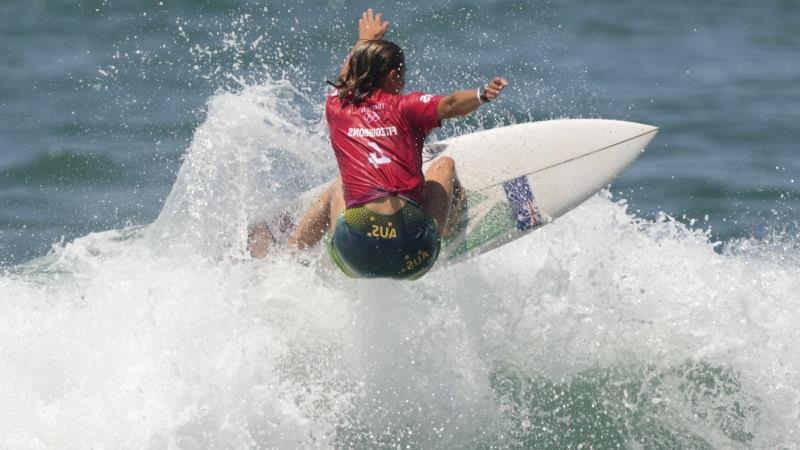Ichinomiya: They are serving fish tacos in Ichinomiya, 90 minutes outside Tokyo. The sun is blazing its way towards 30 degrees, there are horse paddocks to the right, beach bungalows to the left. It’s Japanese with a Californian twist.
Tokyo families have taken their cars east to the beachside town. They unpack their tents, bodyboards and bento boxes. If they take the path north, they land at Kujukuri beach where the coronavirus is momentarily washed away by the shore break. If they take the path south, they land at a security checkpoint manned by the Japanese military and the first surfing event ever held at an Olympics.
Australia’s Sally Fitzgibbons competes during the first round of the women’s surfing competition at the 2020 Summer Olympics at Tsurigasaki beach in Ichinomiya, Japan.Credit:AP
Here, the waves have scarcely reached above knee height for the past week but on Sunday, they broke through a pandemic to send 40 surfers into the water at Tsurigasaki beach.
Just after 11am the first of Australia’s two medal prospects took her place in the line-up for her first-round. Sally Fitzgibbons, the whippet from Gerroa, NSW, was an Olympian.
The 30-year-old watched set after set go by as her competitors Brisa Hennessy from Costa Rica, Bianca Buitendag from South Africa and local star Mahina Maeda dropped into the two-metre swell on this Olympic coast.
With six minutes to go of her 30-minute heat, Fitzgibbons needed a 5.8 point score to come in the top two and go straight into the third round. Each wave looked promising until it didn’t. Then it happened, a long right-hander from out the back that delivered speed, power and flow. A 7 earned, more than she needed.
“Sometimes you just have to be patient, you look at features and you just have to problem-solve,” she said after the heat. “You just gotta trust the opportunity will come and back yourself.”
Australia’s Stephanie Gilmore during the first round of the women’s surfing competition at the 2020 Summer Olympics on Sunday.Credit:AP
Stephanie Gilmore, the seven-time world champion from Kingscliff, NSW, hit the water 10 minutes later. She had nothing left to prove to anyone but herself.
Carving through the heat, she landed the highest combined score of the session at 14.38 but this icon of world surfing still couldn’t believe she too was now an Olympian.
“I was 12-years-old when I watched Cathy Freeman win the gold medal. I thought she was like a real-life superhero. So I thought, ‘oh, man, I want to do that’. I always had a dream of going to the Olympics, but I thought it was gonna be like javelin or discus, or something,” she said.
“When they announced surfing was going to be in the Olympics it was great for me because it gave me a new goal, a new dream to chase. World championships are incredible, but an Olympic gold has got a real sparkle to it, I guess.”
They are both through to the third round on Monday, along with Lennox Head local Owen Wright and Julian Wilson, from Coolum, Queensland, in the men’s draw.
Australians Julian Wilson, Stephanie Gilmore and Owen Wright at a practice session at Tsurigasaki Surfing Beach, Japan.Credit:Getty Images
Despite the open air lowering the risk of coronavirus transmission and the families holidaying on the beach nearby, there will be no crowds to watch them. Here like at all Tokyo Games venues, only their coaches and other competitors can cheer them on.
The quartet faces another surprise in this most turbulent of Games. Typhoon Nepartak is on its way to Japan, with forecasters predicting it might bring up to 15-metre swells off some parts of the coast.
In any other sport this might be greeted with some apprehension but for the Australians missing the barrels of Bells or Burleigh, it can’t come soon enough.
“I think ever since we knew that the Olympic surfing was going to be in the ocean in Japan, every surfer has been trying to manifest a typhoon,” said Gilmore.
If Gilmore was Japanese she might have been talking to Fujin, the god of wind and one of the oldest Shinto spirits.
As it happens, the Olympics is not the only thing Greece gave Japan. In the third century BC, Alexander the Great conquered Asia Minor. With him, came the Greek gods that would influence Buddhism and later Shintoism.
One of them would become Fujin who to this day still carries with him the windbag first harnessed by the Greek god. A prickly character, he is both a god and a demon.
Much like these pandemic Olympics, he brings both joy and wrath.
Never miss a medal or great sporting moment with our Olympic update emailed daily. Sign up for our Sport newsletter here.
Most Viewed in Sport
From our partners
Source: Read Full Article



